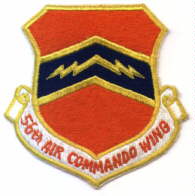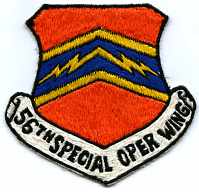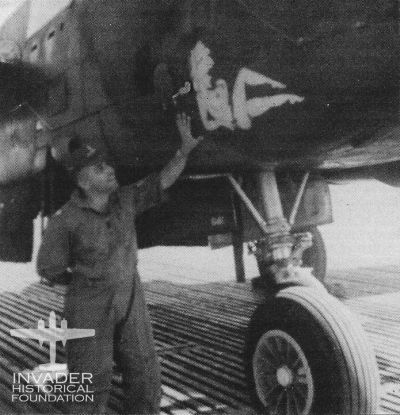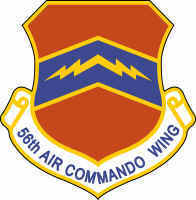56th Special Operations Wing: Difference between revisions
(→Planes) |
No edit summary |
||
| (5 intermediate revisions by the same user not shown) | |||
| Line 22: | Line 22: | ||
This unit was originally called the 56th Air Commando Wing. The name was changed in 1968 to the 56th Special Operations Wing. Two of the unit's patches can be seen below. Today this unit exists as the 56th Fighter Wing and is based in | This unit was originally called the 56th Air Commando Wing. The name was changed in 1968 to the 56th Special Operations Wing. Two of the unit's patches can be seen below. Today this unit exists as the 56th Fighter Wing and is based at Luke Air Force Base in Glende, AZ. <br> | ||
[[File:56acw.jpg]] [[File:56SOW.jpg]] | [[File:56acw.jpg]] [[File:56SOW.jpg]] | ||
The following excerpt comes from the History of the 56th Special Operations Wing - Oct-Dec 1969 Vol 1, Pages 155-156: <br> | |||
This quarter marked the end of one of the 56th Special Operations Wing's most active tactical squadrons and the end of another era for a USAF aircraft, the A-26. On 1 December 1969 the 609th Special Operations Squadron was deactivated after more than 2 years of active service with the wing. It was activated in Aug 1967. | |||
The A-26s tour of duty with the 56th Special Operations Wing first began nearly a year earlier as eight B-26s (as the A-26s were formerly known) were deployed TDY to Nakhon Phanom RTAFB under Operation "Big Eagle". [IHF NOTE: See: [[603rd Special Operations Squadron]] for complete list of planes participating in Big Eagle.] The B-26s were then redesignated A-26s. | |||
Their operations proved so successful that they were kept on a permanent basis. In January 1967, the A-26s were merged with the [[606th Air Commando Squadron]] (now Special Operations Squadron). As their mission grew, the Nimrods gradually acquired more crews and aircraft. By December 1968, the [[609th Air Commando Squadron]] had a total of 18 aircraft. | |||
In the slightly more than 2 years of its existence, the 609th flew 7,159 combat sorties for a total of 19,762.7 combat flying hours. During this period, the Nimrods were credited with destroying 4,268 trucks and damaging 696 more. The Nimrods also destroyed 201 enemy gun emplacements and silenced an additional 696. The extremely high truck kill record, averaged slightly better than 1 truck destroyed or damaged for each one and one-half sortie flown. This was significantly higher than any other weapon system currently in use in the Southeast Asian Theater. | |||
| Line 202: | Line 214: | ||
|Sent to 1st ACW. | |Sent to 1st ACW. | ||
|} | |} | ||
==Images== | |||
Captain Jim Gallazzi, Maintenance Officer, admires nose art on a plane in Vietnam. Sources report this plane to be 64-17646, but the number on the nose wheel door doesn't seem to corroborate that.<br/> | |||
[[File:Galluzzi. NKP..jpg|400px]] | |||
[[Category:B-26K]] | |||
Latest revision as of 15:22, 9 February 2021
| 56th Special Ops Wing | |||
|---|---|---|---|
| Air Force: | |||
| Division: | |||
| Wing: 56th Air Commando Wing 56th Special Operations Wing | |||
| Active: | |||
| Theater | |||
| Motto: | |||
| Aircraft: Douglas B-26K | |||
This unit was originally called the 56th Air Commando Wing. The name was changed in 1968 to the 56th Special Operations Wing. Two of the unit's patches can be seen below. Today this unit exists as the 56th Fighter Wing and is based at Luke Air Force Base in Glende, AZ.


The following excerpt comes from the History of the 56th Special Operations Wing - Oct-Dec 1969 Vol 1, Pages 155-156:
This quarter marked the end of one of the 56th Special Operations Wing's most active tactical squadrons and the end of another era for a USAF aircraft, the A-26. On 1 December 1969 the 609th Special Operations Squadron was deactivated after more than 2 years of active service with the wing. It was activated in Aug 1967.
The A-26s tour of duty with the 56th Special Operations Wing first began nearly a year earlier as eight B-26s (as the A-26s were formerly known) were deployed TDY to Nakhon Phanom RTAFB under Operation "Big Eagle". [IHF NOTE: See: 603rd Special Operations Squadron for complete list of planes participating in Big Eagle.] The B-26s were then redesignated A-26s.
Their operations proved so successful that they were kept on a permanent basis. In January 1967, the A-26s were merged with the 606th Air Commando Squadron (now Special Operations Squadron). As their mission grew, the Nimrods gradually acquired more crews and aircraft. By December 1968, the 609th Air Commando Squadron had a total of 18 aircraft.
In the slightly more than 2 years of its existence, the 609th flew 7,159 combat sorties for a total of 19,762.7 combat flying hours. During this period, the Nimrods were credited with destroying 4,268 trucks and damaging 696 more. The Nimrods also destroyed 201 enemy gun emplacements and silenced an additional 696. The extremely high truck kill record, averaged slightly better than 1 truck destroyed or damaged for each one and one-half sortie flown. This was significantly higher than any other weapon system currently in use in the Southeast Asian Theater.
Units
603rd Special Operations Squadron, Detachment-1 (Attached)
606th Special Operations Squadron
609th Special Operations Squadron
634th Combat Support Group
Planes
Planes assigned to this wing were assigned to a component unit of the wing, but for the sake of completeness I have listed all of the planes that were assigned to any squadron in the wing in this table.
| Serial Number | Date Assigned | Date Left | Comments |
|---|---|---|---|
| 64-17641 | 30 Sep 1967 | 29 Dec 1967 | Shot down by AA. |
| 64-17642 | 21 Dec 1966 | 27 Aug 1967 | Shot down. |
| 64-17643 | 11 Jun 1966 | 25 Jul 1966 | Destroyed in crash. Was attached to the 606 ACS, 56 AWC, but on paper was part of the 603 ACS, 1 ACW. |
| 64-17644 | 1 Nov 1967 | 12 Nov 1969 | Sent to Clark AFB for storage. |
| 64-17645 | 31 May 1967 | 10 Nov 1969 | Scuttled in Vietnam in 1975. |
| 64-17646 | 6 Aug 1967 | 8 Jul 1969 | Crashed during combat. |
| 64-17648 | 4 oct 1967 | 30 Apr 1968 | Shot down by AA. |
| 64-17649 | 13 May 1967 | 10 Nov 1969 | Sent to Clark AFB for storage. |
| 64-17650 | 11 Jun 1966 | 28 Jun 1966 | Shot down by enemy ground forces. |
| 64-17651 | 11 Oct 1967 | 10 Nov 1969 | Sent to Clark AFB for storage. |
| 64-17652 | 27 Sep 1968 | 10 Nov 1969 | Sent to Clark AFB for storage. |
| 64-17653 | 14 Jul 1968 | 13 Nov 1969 | Sent to Clark AFB for Storage. |
| 64-17654 | 31 Oct 1967 | 10 Nov 1969 | Sent to Clark AFB for Storage. |
| 64-17660 | 21 Dec 1966 | 12 Nov 1969 | Went back to SMAAR Aug 1967 and Apr 1968 for repairs. Sent to Davis-Monthan AFB for storage. |
| 64-17661 | 21 Oct 1967 | 10 Nov 1969 | Sent to Clark AFB for storage. |
| 64-17662 | 16 Jun 1967 | 22 Aug 1967 | Missing in Action 22 Aug 1967. |
| 64-17664 | 21 Dec 1966 | 9 Nov 1967 | Sent to Kadena, JP, then to OnMark. |
| 64-17665 | 11 Jun 1966 | 10 Nov 1969 | Sent to Clark AFB for storage. |
| 64-17666 | 1 Nov 1968 | 10 Nov 1969 | Sent to Clark AFB for storage. |
| 64-17667 | 11 Jun 1967 | 23 Mar 1969 | Sent to SMAAR Jun 1967. Shot down 23 Mar 1969. |
| 64-17668 | 11 Jun 1966 | 22 Feb 1967 | Shot down by AA 22 Feb 1967. |
| 64-17669 | 11 Jun 1966 | 22 Feb 1967 | Destroyed when 64-17668 exploded in mid-air. |
| 64-17670 | 1 Nov 1968 | 10 Nov 1969 | Sent to Clark AFB for storage. |
| 64-17671 | 11 Jun 1966 | 6 Jul 1967 | Sent back to SMAAR, then 1st ACW. |
| 64-17671 | 21 Nov 1967 | 10 Nov 1969 | Returned to Vietnam. Sent to Clark AFB for storage. |
| 64-17672 | 11 Jun 1966 | 14 Dec 1966 | Shot down 14 Dec 1966 |
| 64-17673 | 21 Dec 1966 | 11 Mar 1969 | Sent to SMAAR Jul 1967. Destroyed in Crash landing 11 Mar 1969. |
| 64-17675 | 1 Dec 1966 | 7 Jun 1968 | Went to OnMark Oct 1967. Sent to 1st ACW. |
| 64-17675 | 1 Nov 1968 | 13 Nov 1969 | Sent to Clark AFB to storage. |
| 64-17676 | 11 Jun 1966 | 3 Aug 1967 | Sent to SMAAR, then 1st ACW. |
| 64-17677 | 3 Aug 1967 | 10 Nov 1969 | Sent to Clark AFB for storage. |
| 64-17678 | 8 Aug 1967 | 13 Nov 1967 | Sent to 1st ACW. |
Images
Captain Jim Gallazzi, Maintenance Officer, admires nose art on a plane in Vietnam. Sources report this plane to be 64-17646, but the number on the nose wheel door doesn't seem to corroborate that.

